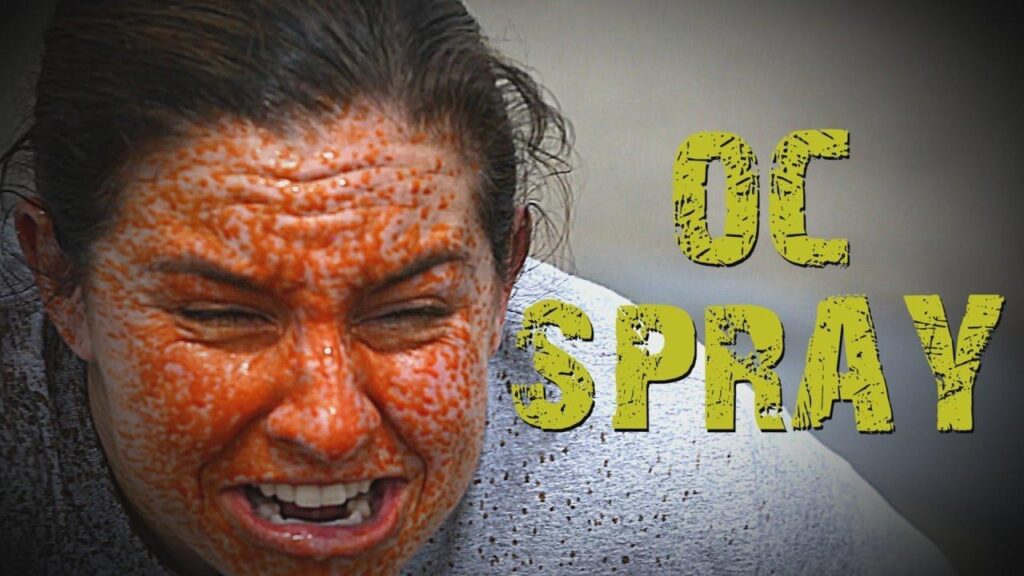Table of Contents
- Understanding the Immediate Effects of Pepper Spray on the Body
- Step-by-Step Actions to Take Immediately After Exposure
- Effective Techniques for Decontaminating Eyes and Skin
- When to Seek Professional Medical Help Following Pepper Spray Exposure
- In Summary
Understanding the Immediate Effects of Pepper Spray on the Body
Once pepper spray comes into contact with your skin, eyes, or respiratory system, it triggers an intense and immediate inflammatory response. The active compound, capsaicin, binds to pain receptors, causing a sharp burning sensation and uncontrollable tearing. Within seconds, you might experience severe eye irritation, temporary blindness, coughing, and difficulty breathing. The mucous membranes swell, and nasal passages become congested, intensifying the discomfort and impairing normal sensory functions. This reaction serves as a protective mechanism but can be overwhelming and frightening if unprepared.
Understanding these physiological reactions is essential for responding effectively and minimizing harm. Aside from the ocular and respiratory effects, the skin exposed to pepper spray often develops a red, burning rash accompanied by a sensation akin to sunburn. While these symptoms are typically temporary, lasting from 15 to 45 minutes, their severity varies based on individual sensitivity and exposure level. Key immediate effects include:
- Severe eye irritation and temporary vision impairment
- Excessive tearing and redness
- Coughing, choking, and difficulty breathing
- Burning sensation on skin and mucous membranes
- Increased heart rate and anxiety
Step-by-Step Actions to Take Immediately After Exposure
Immediately following accidental pepper spray exposure, the first priority is to remove yourself from the contaminated area to prevent further irritation. Find a well-ventilated space or, if possible, move outdoors. Next, avoid touching your face, especially the eyes, nose, and mouth, as this can spread the irritant. Rinse your eyes gently with cool water for at least 15 minutes-use a clean cup or a gentle stream to help flush out the spray particles. If available, saline solution can be used for an even more effective rinse. Refrain from rubbing your eyes or skin, as this worsens the burning sensation and potential damage.
Once initial decontamination is underway, employ the following actions for soothing relief and accelerated recovery:
- Remove contaminated clothing: Carefully take off any clothes that may have pepper spray residue and seal them in a plastic bag to prevent cross-contamination.
- Cleanse affected skin: Wash the exposed areas with mild soap and lukewarm water-avoid harsh scrubbing.
- Use cold compresses: Apply cool, damp cloths to reduce inflammation and soothe burning sensations.
- Seek medical advice: If symptoms persist, worsen, or if exposure is severe, promptly consult a healthcare professional to rule out complications.
Effective Techniques for Decontaminating Eyes and Skin
In the immediate aftermath of pepper spray exposure, prompt and precise decontamination is crucial to alleviate discomfort and minimize further irritation. Begin by flushing the affected eyes with cool, clean water; using lukewarm water can open the pores and potentially increase absorption of irritants. Maintain a gentle flow for at least 15 minutes without rubbing or touching the eyes, as friction can worsen the symptoms. If available, saline solution serves as an excellent option to rinse the eyes gently while providing relief.
When it comes to skin decontamination, avoid using oils, creams, or lotions which can trap the chemical and prolong the burning sensation. Instead, utilize soap-preferably a mild, fragrance-free variety-along with copious amounts of water to cleanse the exposed areas. It’s essential to remove contaminated clothing carefully to prevent contact with other skin regions. Following washing, allow the skin to air dry in a cool environment; avoid using towels or vigorous drying methods that may cause further irritation. Employing these techniques ensures a safer and more effective response to pepper spray exposure.
- Use cold water only: Avoid hot water which can exacerbate irritation.
- Avoid rubbing eyes or skin: This can intensify inflammation.
- Remove contaminated clothing immediately: Prevents further skin contact.
- Seek medical attention if symptoms persist: Prolonged pain or vision issues require professional care.
When to Seek Professional Medical Help Following Pepper Spray Exposure
While most cases of pepper spray exposure resolve with proper self-care, there are critical signs that warrant immediate professional medical attention. If you experience severe or persistent pain that does not improve after thorough rinsing, or if your vision remains blurred or impaired beyond 20 minutes, it’s essential to seek help. Additionally, if you develop symptoms such as difficulty breathing, chest tightness, or a rapid heartbeat, these could be indications of a serious allergic reaction or respiratory distress requiring urgent care.
Other warning signs include:
- Extreme swelling or difficulty swallowing
- Prolonged coughing or wheezing
- Skin blistering or intense redness beyond the initial burning sensation
- Exposure in vulnerable groups, such as young children, elderly individuals, or those with pre-existing respiratory conditions
In any uncertain situation, don’t hesitate to contact a healthcare professional. Prompt intervention can prevent complications and ensure your safety after exposure.
In Summary
In conclusion, accidental exposure to pepper spray can be an overwhelming experience, but knowing how to respond safely and effectively can make all the difference. By staying calm, rinsing the affected areas with cool water, avoiding rubbing your eyes or skin, and seeking medical attention if symptoms persist, you can minimize discomfort and promote a quicker recovery. Remember, preparation and awareness are key-keeping a bottle of water or saline solution handy and understanding first aid steps can help you handle such incidents confidently. Stay informed, stay safe, and always prioritize your well-being when faced with unexpected situations like pepper spray exposure.Check Our Other Blogs
- StunGun – Your Trusted Source for Stun Guns, Laws, and Self-Defense Tips
- PepperSprayLaws – Your Trusted Resource for Pepper Spray Information
- StunGunLaws – Your Trusted Guide to Stun Gun Legality and Safety




